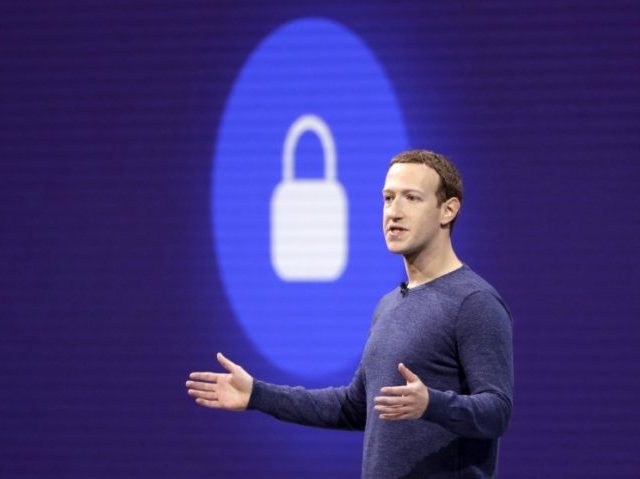Facebook CEO Mark Zuckerberg said he wants to shift the social media giant from “open and connected” to privacy-based, with a focus on keeping private messages secure. Not everyone is convinced, however.
In a Facebook post, Wednesday, titled, “A Privacy-Focused Vision for Social Networking,” Zuckerberg expressed his interest in changing Facebook as a platform.
“Over the last 15 years, Facebook and Instagram have helped people connect with friends, communities, and interests in the digital equivalent of a town square. But people increasingly also want to connect privately in the digital equivalent of the living room,” declared Zuckerberg. “As I think about the future of the internet, I believe a privacy-focused communications platform will become even more important than today’s open platforms. Privacy gives people the freedom to be themselves and connect more naturally, which is why we build social networks.”
“Many people prefer the intimacy of communicating one-on-one or with just a few friends. People are more cautious of having a permanent record of what they’ve shared. And we all expect to be able to do things like payments privately and securely,” he explained, adding, “now, with all the ways people also want to interact privately, there’s also an opportunity to build a simpler platform that’s focused on privacy first.”
Zuckerberg then noted, “I understand that many people don’t think Facebook can or would even want to build this kind of privacy-focused platform — because frankly we don’t currently have a strong reputation for building privacy protective services, and we’ve historically focused on tools for more open sharing. But we’ve repeatedly shown that we can evolve to build the services that people really want, including in private messaging and stories.”
“I believe the future of communication will increasingly shift to private, encrypted services where people can be confident what they say to each other stays secure and their messages and content won’t stick around forever,” the Facebook CEO predicted. “This is the future I hope we will help bring about.”
Zuckerberg then laid out the key areas Facebook would need to focus on for a more privacy-based platform: Private interactions, encryption, reducing permanence, safety, interoperability, and secure data storage.
Private interactions. People should have simple, intimate places where they have clear control over who can communicate with them and confidence that no one else can access what they share.
Encryption. People’s private communications should be secure. End-to-end encryption prevents anyone — including us — from seeing what people share on our services.
Reducing Permanence. People should be comfortable being themselves, and should not have to worry about what they share coming back to hurt them later. So we won’t keep messages or stories around for longer than necessary to deliver the service or longer than people want them.
Safety. People should expect that we will do everything we can to keep them safe on our services within the limits of what’s possible in an encrypted service.
Interoperability. People should be able to use any of our apps to reach their friends, and they should be able to communicate across networks easily and securely.
Secure data storage. People should expect that we won’t store sensitive data in countries with weak records on human rights like privacy and freedom of expression in order to protect data from being improperly accessed.
Zuckerberg claimed that over “the next few years,” Facebook intends “to rebuild more of our services around these ideas,” however, not everyone was convinced.
In a Thursday article for the MIT Technology Review, editor and journalist Konstantin Kakaes claimed Zuckerberg’s post “shows why Facebook needs to be broken up.”
“Mark Zuckerberg doesn’t understand what privacy means—he can’t be trusted to define it for the rest of us,” Kakaes proclaimed. “Zuckerberg’s essay is a power grab disguised as an act of contrition. Read it carefully, and it’s impossible to escape the conclusion that if privacy is to be protected in any meaningful way, Facebook must be broken up.”
“Facebook has minted money because it has figured out how to commoditize privacy on a scale never before seen. A diminishment of privacy is its core product. Zuckerberg has made his money by performing a sort of arbitrage between how much privacy Facebook’s 2 billion users think they are giving up and how much he has been able to sell to advertisers,” he continued. “He says nothing of substance in his long essay about how he intends to keep his firm profitable in this supposed new era. That’s one reason to treat his Damascene moment with healthy skepticism.”
Kakaes further described Zuckerberg’s post as “a bait-and-switch,” claiming, “What he’s proposing is essentially a beefed-up version of WhatsApp.”
“Monopoly power is problematic even for companies that just make a lot of money selling widgets: it allows them to exert undue influence on regulators and to rip off consumers. But it’s particularly worrisome for a company like Facebook, whose product is information,” Kakaes expressed. “This is why it should be broken up[…] At a minimum, splitting WhatsApp and Instagram from Facebook is a necessary first step. This makes the company smaller, and therefore less powerful when it comes to negotiating with other businesses and with regulators.”
Marketplace tech correspondent Molly Wood described Zuckerberg’s post as “cynical and opportunistic,” while journalist Dr. Courtney Radsch claimed, “This is an about face for @facebook.”
“Zuck’s ‘privacy focused vision for social networking’ mentions no plan or intention to stop selling peoples’ activity to third parties,” pointed out lawyer Denise Howell.
Charlie Nash is a reporter for Breitbart Tech. You can follow him on Twitter, or like his page at Facebook.

COMMENTS
Please let us know if you're having issues with commenting.